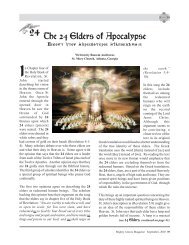Purgatory
Purgatory
Purgatory
Create successful ePaper yourself
Turn your PDF publications into a flip-book with our unique Google optimized e-Paper software.
“Many are they who say of me, ‘there is no help for him in God.’” (Ps 3:2)<br />
✥ Lecture VII: The <strong>Purgatory</strong> ✥<br />
According to the Roman Catholic Church, purgatory (Lat., ‘purgare’, to make clean, to purify) is a<br />
place or a condition of temporal punishment for those who died in a state of grace yet are not entirely free<br />
from lesser faults or have not fully paid the satisfaction due to their transgressions. The punishments in this<br />
alleged place is referred to as ‘purifying fire’ (Lat., ‘purgatorius ignis’) and from which the term ‘purgatory’<br />
derives. The Roman Church teaches that the vast majority of believers is neither good enough for heaven nor<br />
bad enough for hell and thus is tormented in the purgatory to be purified and cleansed. The All Souls’ Day,<br />
in the Roman Church, is a day for commemoration of all the faithful departed, those baptized Christians who<br />
are believed to be suffering in purgatory because they have died with the guilt of lesser sins on their souls. It<br />
is celebrated on November 2, or on November 3 if November 2 is a Sunday. The Roman doctrine holds that<br />
the prayers of the faithful on earth will help ease the sufferings and help cleanse these souls in order to fit<br />
them for entering heaven. In what follows, we shall, by the grace of God, present the reasons why we reject<br />
the heresy of purgatory:<br />
1. The purgatory contradicts the doctrine of Atonement and Redemption:<br />
The basic foundation of the doctrine of Atonement and Redemption is that human beings are totally<br />
incapable of satisfying the Divine Justice of God and thus God who is alone unlimited was Incarnate and<br />
provided us with unlimited atonement and forgiveness. The existence of a place of purifying sufferings for<br />
the believers implies that the blood of our Saviour was not enough to purify us in the first place.<br />
• “The blood of Jesus Christ His Son cleanses us from all sin… If we confess our sins, He is faithful<br />
and just to forgive us our sins and to cleanse us from all unrighteousness.” (1 Jn 1:7-9)<br />
• “He is able to save to the uttermost those who come to God through Him…” (Heb 7:25)<br />
If human sufferings were capable of satisfying the Divine Justice, then what was the need for Lord<br />
Jesus Christ’s Incarnation and death on the cross? Why didn’t God just increase the amount of suffering in<br />
purgatory or the period we spend there and then take us to heaven? Therefore, we totally reject any notion of<br />
satisfying the Divine justice through good works, asceticism, or punishments.<br />
• “ All have sinned and fall short of the glory of God, being justified freely By His grace through the<br />
redemption that is in Christ Jesus…” (Rom 3:24)<br />
2. The purgatory contradicts the good news of the Holy Gospel:<br />
The angel said to the shepherds, “Do not be afraid, for I bring you good tidings of great joy which<br />
will be to all people. For there is born to you this day in the city of David a Savior, who is Christ the Lord.”<br />
(Lk 2:10,11) – How are we supposed to rejoice if the Savior cannot save us from the torments and fire of the<br />
purgatory? How are we supposed to have a desire to depart and be with the Lord like St. Paul (Phil 1:23)<br />
while the flames of the purgatory are awaiting us? This explains the paranoiac question ‘Are you saved?’ of<br />
the Protestants who went out of the Roman Church.<br />
3. The purgatory contradicts God’s Justice:<br />
St. Paul said that we “were bought at a price” (1 Cor 6:20). – This price is the precious blood of our<br />
Lord and Savior Jesus Christ who said on the cross “It is finished” (Jn 19:30). – The sufferings and torments<br />
in this alleged purgatory imply that the price of sins will be paid twice, which is in clear contradiction with<br />
the Divine Justice. Moreover, according to this doctrine, the purgatory is a place of torment of the spirits<br />
while the bodies are lying in the graves not feeling a thing. This also contradicts the Divine Justice because it<br />
implies punishing the spirit only and not the body that participated with it in committing the sin and may<br />
even have been the cause of it as “the flesh lusts against the Spirit” (Gal 5:17). – Also, how will the<br />
allegedly purged spirit be united with an un-purged body on the Last day?<br />
252
4. The purgatory contradicts God’s Mercy:<br />
David the Prophet said, “Purge me with hyssop, and I shall be clean; wash me, and I shall be whiter<br />
than snow.” (Ps 51:7) He did not say ‘purge me with fire, burn me in purgatory and I shall be clean.’ Human<br />
nature is not purged with fire but rather with the grace of our merciful God and the work of His Holy spirit.<br />
Our Lord said, “Though your sins are like scarlet, they shall be as white as snow; though they are red like<br />
crimson, they shall be as wool.” (Is 1:18) – This will not occur through the tormenting flames of purgatory<br />
after departing from this world but rather through the work of the Holy Spirit in repentance during this<br />
present life.<br />
• “Then I will sprinkle clean water on you, and you shall be clean; I will cleanse you from all your<br />
filthiness and from all your idols.” (Ezek 36:25)<br />
Purging is an act of mercy and grace not of punishment, it takes place here on earth not after death,<br />
and it is through clean water not tormenting flames of fire!<br />
5. The purgatory contradicts God’s Promises:<br />
Through the precious blood of Lord Jesus Christ and the work of the Holy Spirit in repentance, God<br />
forgives our sins and no longer remembers them:<br />
• “If a wicked man turns from all his sins … none of the transgressions which he has committed shall<br />
be remembered against him …” (Ezek 18:21,22)<br />
• “… Having wiped out the handwriting of requirements that was against us, which was contrary to us.<br />
And He has taken it out of the way, having nailed it to the cross.” (Col 2:14)<br />
The purgatory implies that the spirits of the believers will have to suffer prior to going to heaven even<br />
though God has promised to forgive and forget their sins. Notice that in the parable of the creditor and the<br />
two debtors, which Lord Jesus Christ said to Simon the Pharisee, the creditor “freely forgave” both debtor;<br />
the one who owed five hundred denarii and the one who owed fifty because “they had nothing with which to<br />
repay” (Lk 7:42)<br />
6. The purgatory contradicts Holy Scriptures:<br />
The doctrine of purgatory does not possess any Scriptural basis but rather contradicts Holy Scriptures<br />
creating several theological problems:<br />
• Our Lord said to the right thief, “Assuredly, I say to you, today you will be with Me in Paradise.”<br />
(Lk 23:43) – Now, if this alleged purgatory indeed exists, why then didn’t the thief go there?<br />
• “And the dead in Christ will rise first. Then we who are alive and remain will be caught up together<br />
with them in the clouds to meet the Lord in the air. And thus we shall always be with the Lord.”<br />
(1 Thess 4:16,17) – Here St. Paul describes the Last Day saying that those faithful who are still alive<br />
will meet the Lord with those who rise from the dead and then remain with Him always. Are these<br />
faithful exempt from purgatory? Is God showing partiality towards them?<br />
• In the story of the rich man and Lazarus (Lk 16:19-31) we read about two places; one for comfort<br />
and the other for torment. Moreover, there is a great gulf fixed between the two that prevents people<br />
from moving from one place to the other. Now where is it mentioned that there is such a purgatory?<br />
• The Roman Church falsely teaches that there is a ‘particular’ judgment that takes place after one’s<br />
death during which the eternal fate is determined. The ungodly will be sent to hell, the saints will be<br />
sent to heaven and the majority of the faithful will be sent to purgatory to be tormented until they<br />
become worthy of entering heaven. Now this contradicts Holy Scripture that testifies that there is<br />
only one general judgment on the Last Day for all (Mt 16:27; 25:46; Jn 5:28,29; Rev 20:11-15)<br />
253
✥ FAQ:<br />
Q1: St. Paul said, “If anyone’s work is burned, he will suffer loss; but he himself will be saved, yet so<br />
as through fire.” (1 Cor 3:15) – Does this fire refer to the purgatory?<br />
A1: No it does not for the following reasons:<br />
à This fire is for works and not individuals “the fire will test each one’s work” (1 Cor 3:13).<br />
à This fire is for testing not tormenting.<br />
à This fire will be on the Last Day “for the Day will declare it, because it will be revealed by fire” (1 Cor<br />
3:13) while the alleged fire of purgatory is supposedly prior to the Last Day.<br />
à This fire will cause loss “if anyone’s work is burned, he will suffer loss” (1 Cor 3:15) while the fire of<br />
purgatory allegedly purifies the faithful and prepares them to go to heaven.<br />
à The words “he himself will be saved, yet so as through fire” signify that this person will be scarcely saved<br />
– “If the righteous one is scarcely saved, where will the ungodly and sinner appear?” (1 Pet 4:18) –<br />
This symbolic fire brings to mind what was said about Joshua the high priest during his life on earth, “Is this<br />
not a brand plucked from the fire?” (Zech 3:2)<br />
Q2: Our Lord said, “whoever speaks against the Holy Spirit, it will not be forgiven him, either in this<br />
age or in the age to come.” (Mt 12:32) – What is the forgiveness in the age to come?<br />
A2: The forgiveness in the age to come applies to those who were wrongly excommunicated by the Church<br />
in this age also anyone who repents but for whatever reason could not confess and dies without hearing the<br />
forgiveness from the priest in this age. Their forgiveness will be declared or announced in the age to come.<br />
Q3: Our Lord said, “Agree with your adversary quickly, while you are on the way with him, lest your<br />
adversary deliver you to the judge, the judge hand you over to the officer, and you be thrown into<br />
prison. Assuredly, I say to you, you will by no means get out of there till you have paid the last penny.”<br />
(Mt 5:25,26) – Is this prison the purgatory?<br />
A3: No it is not.<br />
à If our Lord’s words were taken literally, then they are referring to social dealings between people. Now, if<br />
they were interpreted symbolically they will not refer to purgatory either. Because all the Church fathers who<br />
interpreted this portion of the Sermon on the Mount symbolically did not refer to purgatory at all. The words<br />
“till you have paid the last penny” are interpreted as meaning “never” – Thus the Judge is God, the officer is<br />
an angel, and the prison is eternal hell. This is obvious from the parable of the unforgiving servant who owed<br />
his master ten thousand talents (Mt 18:24) and was not able to pay (Mt 18:25) yet in spite of being forgiven<br />
this huge dept, he did not have compassion on his fellow servant who owed him only a hundred denarii.<br />
Thus his master “delivered him to the torturers until he should pay all that was due to him.” (Mt 18:34)<br />
This parable was referring to the eternal punishment of those who do not forgive others and even though our<br />
Lord said, “until he should pay” we know that this is an impossibility because our Lord initially said, “he<br />
was not able to pay” (Mat 18:25) – Moreover, if this prison were purgatory, how will the spirit alone be able<br />
to pay the last penny without the body, which was the accomplice in committing sin?<br />
* This lecture is adapted from ‘Why Do We Reject <strong>Purgatory</strong>?’ by H.H. Pope Shenouda III.<br />
254

















